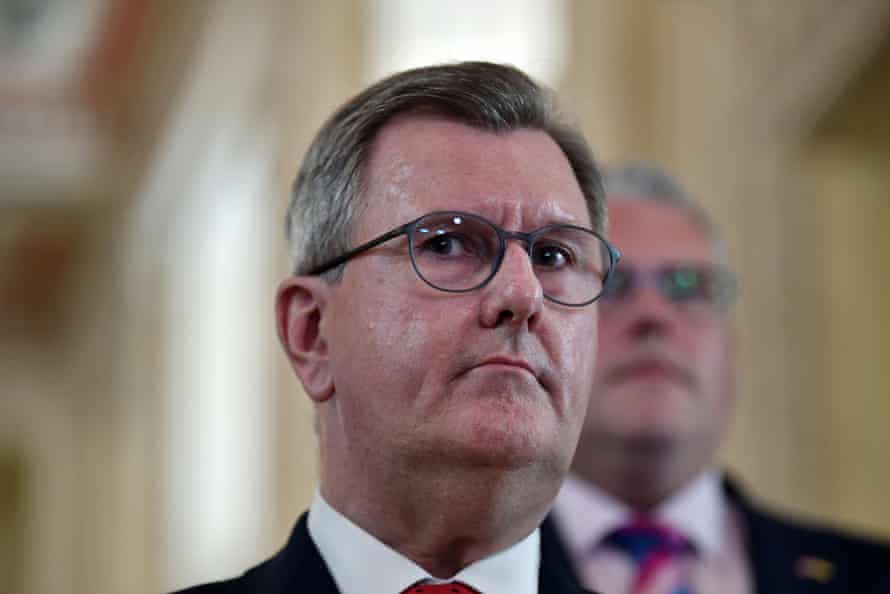
Truss: Northern Ireland Bill ‘reasonable [and] practical measures for problems’
Foreign secretary Liz Truss has made comments alongside the bill being published. She said it will support the Good Friday agreement, and measures were “reasonable [and] practical”.
She said: “This bill will uphold the Belfast (Good Friday) Agreement and support political stability in Northern Ireland. It will end the untenable situation where people in Northern Ireland are treated differently to the rest of the United Kingdom, protect the supremacy of our courts and our territorial integrity.
“This is a reasonable, practical solution to the problems facing Northern Ireland. It will safeguard the EU Single Market and ensure there is no hard border on the island of Ireland. We are ready to deliver this through talks with the EU. But we can only make progress through negotiations if the EU are willing to change the protocol itself – at the moment they aren’t. In the meantime the serious situation in Northern Ireland means we cannot afford to allow the situation to drift.
“As the government of the whole United Kingdom, it is our duty to take the necessary steps to preserve peace and stability.”
An official from the Northern Ireland Chamber of Commerce and Industry has said that anything other than a negotiated agreement between the UK and EU is “simply sub-optimal”.
Stuart Anderson, the chamber’s head of public affairs said that some measures would be helpful, but firms bore the brunt of risk from it.
He said: “While there are attractive elements in today’s proposals for consumer facing businesses in particular, a careful balance must be struck to protect gains made to date by our exporters and agri-food sub-sectors. The apparent shifting of risk onto NI businesses is a cause for particular concern.
“As our businesses fight the challenge of soaring inflation, it is incumbent on the EU and the UK to recommence discussions without any further delay. We stand ready to play our part in supporting lasting solutions that work for NI businesses and households.
“The process of unilateral reform commenced today is not at our request but we remain firmly of the view that an agreed way forward can be found. Anything other than a negotiated outcome is simply sub-optimal.”
Back to Northern Ireland, leader of the Democratic Unionist Party Jeffrey Donaldson has said the party will reserve judgement until the bill progresses. He repeated that the Irish government was “tone deaf” to unionist concerns.
He told the administration in Dublin: “The DUP will judge what constitutes decisive action as we see this bill progressing.
“Start listening to what unionists are saying, understand the nature of our concerns, take your head out of the sand and recognise that there is a problem here that needs to be resolved, stop running away from the problem – let’s get it sorted.”
He said he did not believe the UK Government was acting illegally, PA Media reports.
“I believe that the British government is acting within the provisions of the Withdrawal Agreement.”
One of the side-effects from the potential dispute over the Northern Ireland protocol is the wider-impact on the UK economy, which is already forecast to be one of the worst performing in the G20.
An interesting point from Richard Burge who heads up the London Chamber of Commerce and Industry (LCCI). He has had this to say: “We are hugely concerned that the introduction of the Government’s Northern Ireland Bill risks significant harm to businesses in London and right across the whole of the UK.
“Getting Brexit done was at least meant to deliver certainty to businesses after years of waiting for clarity on the future of the UK’s trade relations with the European Union. The introduction of this bill means we are now teetering on the brink of a trade war with the EU and that will mean further economic pain and falls in investment.
“The UK is already set to be the worst performing economy in the G20 over the next year, why would government risk further economic harm at a moment of inflationary pressure and major land war in Europe? While the protection of the UK internal market is important, it is equally as important to have macroeconomic stability, especially during this cost of living and cost of doing business crises. We urge the government to carefully consider the impact that playing politics with the protocol could have on the British economy.”
The government’s “doctrine of necessity”, which it has based its legal justification on for breaking international law has been met with scepticism by lawyers and government ministers.
Mark Eliott, a professor of public law at the University of Cambridge, has said that the International Law Commission says “necessity” means “grave and imminent peril”. He does not think this has been met.
In the light of those requirements, it seems to me very difficult to argue that there is a situation in which the international law doctrine of necessity applies.
— Mark Elliott (@ProfMarkElliott) June 13, 2022
The position, therefore, is if the NI Protocol Bill is enacted in its present form and enters into force, it is very likely indeed that it will breach international law by putting the UK in breach of clear obligations set out in the Withdrawal Agreement and Protocol. /ends
— Mark Elliott (@ProfMarkElliott) June 13, 2022
David Allen Green, who is a law and policy commentator, has said the legal justification is “perhaps the weakest justification placed into the public domain since the trip to Barnard Castle to test one’s eyesight”, referring to Dominic Cummings’ lockdown trip to Durham in 2020.
Emily Thornberry, Labour’s shadow attorney general has also said it is “complete and utter nonsense”.
Emily Thornberry, shadow AG, says using the doctrine of necessity to justify NI protocol bill is “complete and utter nonsense”. “The doctrine of necessity relies on grave and immediate peril. Boris Johnson’s career may be in peril but it doesn’t seem to apply otherwise”
— Rowena Mason (@rowenamason) June 13, 2022
More reaction from both sides of the Irish border.
The deputy leader of the Alliance Party in Northern Ireland and MP Stephen Farry.
The Bill does real harm to Northern Ireland. It is not supported by majority of MLAs or business community. Immediately, it creates economic uncertainty and harms investment. If enacted, it will undermine NI’s access to SM. Makes it much harder to fix the issues with Protocol. https://t.co/PNSe2E5n0x
— Stephen Farry MP (@StephenFarryMP) June 13, 2022
Neale Richmond, who represents a Dublin seat in the Irish parliament and is the Fine Gael spokesperson for European Affairs has posted a thread on Twitter, and said today is the “lowest day” in the Brexit process and that it was “more suited to Willy Wonka than a serious politician”.
Reaction is continuing to come through, in response to a question from Andrew Marr on LBC, UK Northern Ireland secretary Conor Burns, who is visiting the US, is unable to say he has found anyone in Washington who backs the government’s move.
“I’m not here asking anyone in Washington. Unlike the Labour frontbench I recongise the role of the US, not as a guarantor of the agreement, but as a friend and ally of the United Kingdom, a country that bares goodwill to the island of Ireland.”
Meanwhile the Republic of Ireland’s Europe minister Thomas Byrne has said: “We have to remain calm but firm, the law is on our side, so we don’t go around breaking the law like the British government apparently proposes to do.”
Speaking to LBC, he added: “Undoubtedly there will be consequences. If you run through a traffic light, you will be punished, if you commit some other breaches of the law, you will be punished. There will be consequences for Britain, but we don’t want to get into that space. We want to work this out for the betterment of Northern Ireland.”
‘Doctrine of necessity’ is government’s justification for legality of bill
The government has published legal advice alongside the bill, and explanatory notes.
It says that the legislation is justified because it is a “genuinely exceptional situation”. It also talks about the “doctrine of necessity” which underpins the government’s justification for not breaking international law.
The legal advice begins: “The doctrine of necessity provides a clear basis in international law to justify the non-performance of international obligations under certain exceptional and limited conditions.”
It is understood that ministers have not published all legal advice the government has received. Last week PoliticsHome reported that the government’s top independent legal adviser on the bill said it would be “very difficult” to “credibly” argue it did not break international law.
The legal advice can be found here.
It says: “The government recognises that necessity can only exceptionally be invoked to lawfully justify non-performance of international obligations.
“This is a genuinely exceptional situation and it is only in the challenging, complex and unique circumstances of Northern Ireland that the government has, reluctantly, decided to introduce legislative measures which, on entry into force, envisage the non-performance of certain obligations.
“It is the government’s position that in light of the state of necessity, any such non-performance of its obligations contained in the Withdrawal Agreement and/or the protocol as a result of the planned legislative measures would be justified as a matter of international law.
“This justification lasts as long as the underlying reasons for the state of necessity are present. The current assessment is that this situation and its causes will persist into the medium to long term.”
It adds: “The government’s clear preference remains a negotiated solution with the EU to address the situation of necessity that has arisen.”
Bill could threaten Northern Ireland’s firms’ access to single market
The European Commission vice president Maros Šefčovič has said that the EU views the latest plans from the UK with “significant concern”. Earlier on Monday he warned that if the UK followed through with the threatened bill it would “damage trust” between the two.
Speaking at the commission’s headquarters in Brussels, he said the EU would look at restarting “infringement proceedings” against the UK which have been on hold since September 2021.
“It is with significant concern that we take note of today’s decision by the UK Government to table legislation disapplying core elements of the protocol. Unilateral action is damaging to mutual trust.
“In particular, the protocol provides business operators in Northern Ireland with access to the EU single market for goods. The UK Government’s approach puts this access – and related opportunities – at risk.
“Our aim will always be to secure the implementation of the protocol. Our reaction to unilateral action by the UK will reflect that aim and will be proportionate.”
Truss: Northern Ireland Bill ‘reasonable [and] practical measures for problems’
Foreign secretary Liz Truss has made comments alongside the bill being published. She said it will support the Good Friday agreement, and measures were “reasonable [and] practical”.
She said: “This bill will uphold the Belfast (Good Friday) Agreement and support political stability in Northern Ireland. It will end the untenable situation where people in Northern Ireland are treated differently to the rest of the United Kingdom, protect the supremacy of our courts and our territorial integrity.
“This is a reasonable, practical solution to the problems facing Northern Ireland. It will safeguard the EU Single Market and ensure there is no hard border on the island of Ireland. We are ready to deliver this through talks with the EU. But we can only make progress through negotiations if the EU are willing to change the protocol itself – at the moment they aren’t. In the meantime the serious situation in Northern Ireland means we cannot afford to allow the situation to drift.
“As the government of the whole United Kingdom, it is our duty to take the necessary steps to preserve peace and stability.”
The 20-page bill, now live on the government’s website, says that it will give ministers the power to make new laws on the protocol which governs trade between Great Britain and Northern Ireland. It had its first reading in the Commons earlier this evening.
The bill in full can be found here.
The key part of the government’s plans are that businesses exporting to Northern Ireland can choose themselves whether to follow EU or UK standards, which are expected to widen.
Goods for Northern Ireland will then be able to use a green lane, which will mean they will get fewer customs checks. Those destined for EU countries will have to follow a red lane.
The European Court of Justice will also no longer have a say in trade disputes, and it will instead fall to an independent arbitration process.
Goverment publishes Northern Ireland Protocol bill

Rowena Mason
Liz Truss risked a trade war with the EU and accusations of lawbreaking as she published legislation that would allow exports from Britain to Northern Ireland to follow either UK or EU standards and checks.
Publishing the Northern Ireland protocol bill, Truss said the legislation would “fix” issues with the post-Brexit protocol by easing checks for firms selling goods from Britain destined for Northern Ireland rather than the EU. It would also scrap the European court of justice as the arbiter of trade disputes and move to an independent mechanism.
However, the EU, legal experts and even some Conservative MPs have warned that the move is illegal under international law as it gives ministers the powers to disapply parts of the protocol unilaterally, without the agreement of Brussels.

Andrew Sparrow
And Sir Jeffrey Donaldson, the DUP leader, told a briefing at Stormont that the Northern Ireland bill was needed because the EU’s negotiating mandate was “so limited” it could not agree to the changes that were required to the protocol. He went on:
We believe it is right that the UK Government takes this action, the UK Government has a primary responsibility to protect the integrity of the United Kingdom and its internal market, whilst at the same time making reasonable proposals that offer protection to the European Union and their single market,” he said.
We will consider these proposals against our seven tests to determine if they meet what is required to achieve the objectives, which is of course to restore Northern Ireland’s place within the UK internal market, to remove the barriers to trade within the UK, and to enable us then to restore the political institutions and protect the principle of consensus, cross-community consensus which is at the heart of the Belfast Agreement and of how the political institutions operate.
Donaldson also denied that his party was now under pressure because of its stance on the protocol. He said:
I’m not under any pressure. We have strong support from across unionism for the stand that we are taking. I believe that our pressure has brought about what we see today with this bill being published.
That is all from me for tonight. My colleague Harry Taylor is taking over now.

Michelle O’Neill, the Sinn Féin leader in Northern Ireland, has said the Northern Ireland protocol bill being published today is “in clear breach of international law”.
The bill still has not been published, but it is expected within the next hour.
Keir Starmer is facing a revolt by party members in Stroud where 130 activists have signed a letter saying that Doina Cornell, the Labour leader of Stroud district council, should be allowed on the shortlist when the party selects its parliamentary candidate for the town, the Stroud Times reports. In their letter to Starmer and David Evans, the party’s general secretary, the members said:
The decision to prohibit Doina from standing is wrong and we fear will fatally damage our chances of regaining Stroud for Labour; surely something that should be our priority.
Cornell was reportedly blocked from being a candidae because of concerns about her social media activity in the past, although last week she said she had not been given specific reasons for the ban.
A Conservative, Siobhan Baillie, won Stroud at the last election with a majority of 3,840, but the seat was Labour from 1997 to 2020, and won by Labour again in 2017.


